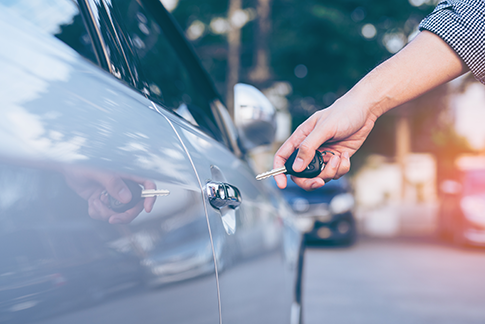Lending your car: am I covered?

In Quebec, you can lend your car to anyone with a valid driver’s licence. However, since no one is immune from having a traffic accident, you’re better to know how automobile insurance works.
Lending your car occasionally to your ensured child
Your child, who received his or her learner’s licence a few months ago, borrows the family car to go visit a friend. On the way, he or she has an accident involving another vehicle. No one is injured but there is significant property damage. Who pays for the repairs to your car? It all depends on your automobile insurance policy.
If you informed your insurer beforehand that your child would drive the car occasionally, you will be covered for the amounts specified in your policy. On the other hand, if you have failed to mention this detail, you may be eligible for partial compensation only. The insurer may even decide to reimburse nothing, arguing that it did not have all the information before issuing your policy.
Declaring every driver who is using your car, including non-family members, will ensure that you have full insurance coverage. Your insurer will calculate the risk represented by you and your occasional drivers and adjust your policy—and your premium—accordingly.
Also, when you register your child as a secondary driver, you help him or her acquire experience behind the wheel that could save him or her money when it comes time to obtain a first insurance policy. Many insurers recognize this kind of experience and adjust the premium accordingly. In sum, informing your insurer of the slightest changes in the use of your vehicle remains the best way of being fully covered and receiving adequate compensation un the event of an accident.
Lending your car to an insured friend or occasionally borrowing his or her vehicle
What happens if you borrow a friend’s car to run a few errands and have an accident? First, be aware that the accident will be entered in the Fichier central des sinistres automobiles (central automobile accident claims database), in the file of the driver involved in the mishap: you.
If the accident occurred when you failed to make a proper stop with your friend’s car, you will be considered totally at fault. Your friend will be eligible for compensation from his or her own insurance company, but only if the policy includes collision coverage, an option contained in Section B of the contract.
Take a few minutes to check with your insurer if you opted for the extra coverage “Civil Liability For Damage to Non-Owned Automobiles” (Endorsement Q.E.F. 27) when you bought your policy. If yes, the damage caused to your friend’s vehicle will be covered by your policy if there is no collision insurance in his or her own policy; you must file a claim with your insurer. This endorsement can also be useful if you rent a vehicle in Canada or the United States for your next trip.
Obviously, in the opposite situation—you’ve lent your car to a friend—the same rules apply: your insurer is responsible for the claim if you have collision insurance on your vehicle and, if you don’t, your friend’s insurance covers it, but only if he or she has Endorsement Q.E.F. 27.

Driving your friend’s car uninsured or lending your vehicle to an uninsured friend
In Quebec, the Automobile Insurance Act obliges every automobile owner to have civil liability insurance, which covers damage to property or personal injury that you may cause in an accident involving the insured vehicle. Don’t forget to carry proof of this coverage when you are driving, whether or not the vehicle belongs to you.
And if despite everything, you or your friend are driving without even having civil liability insurance and are involved in an accident, you could be fined as much as $2,800, in addition to having your licence suspended automatically or being barred from obtaining one. You will also be required to pay for the damages.

Protect your vehicle
See how our Auto and Vehicle Insurance can meet all your needs!